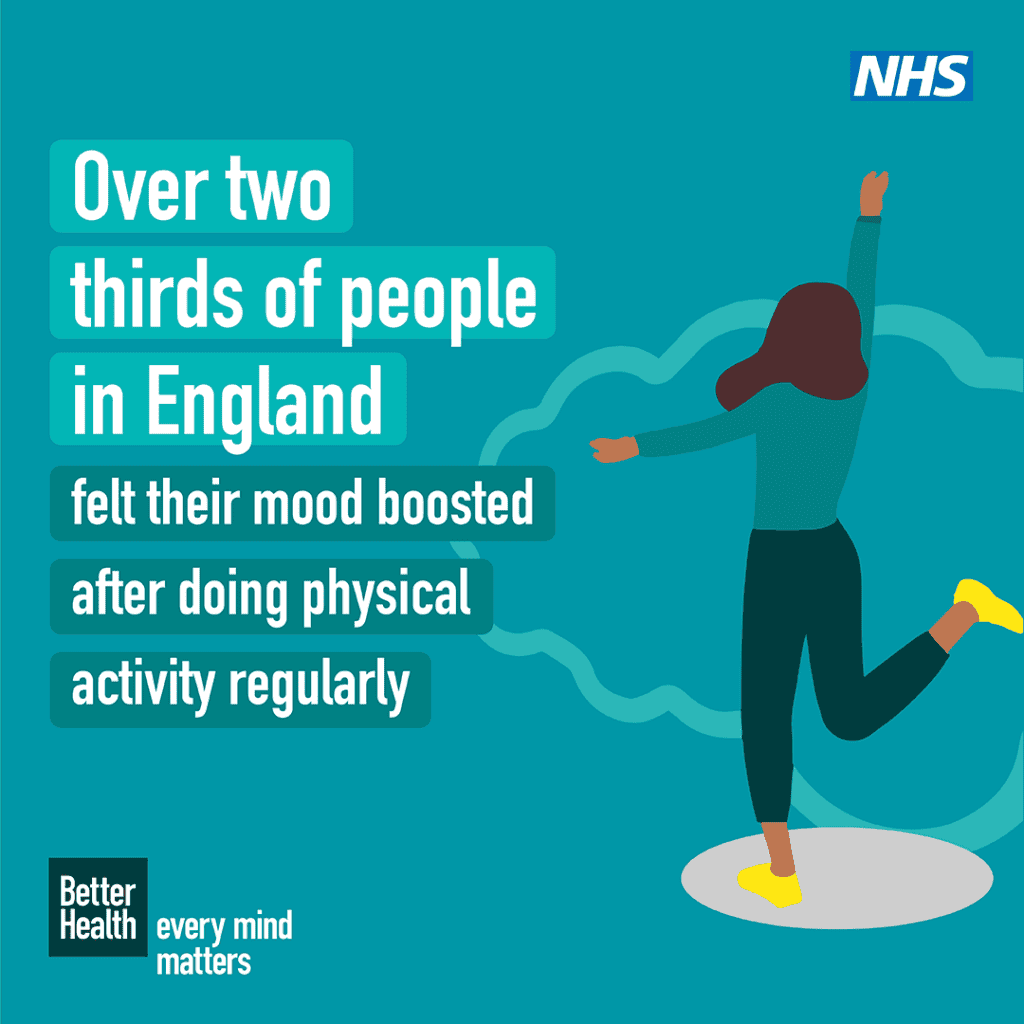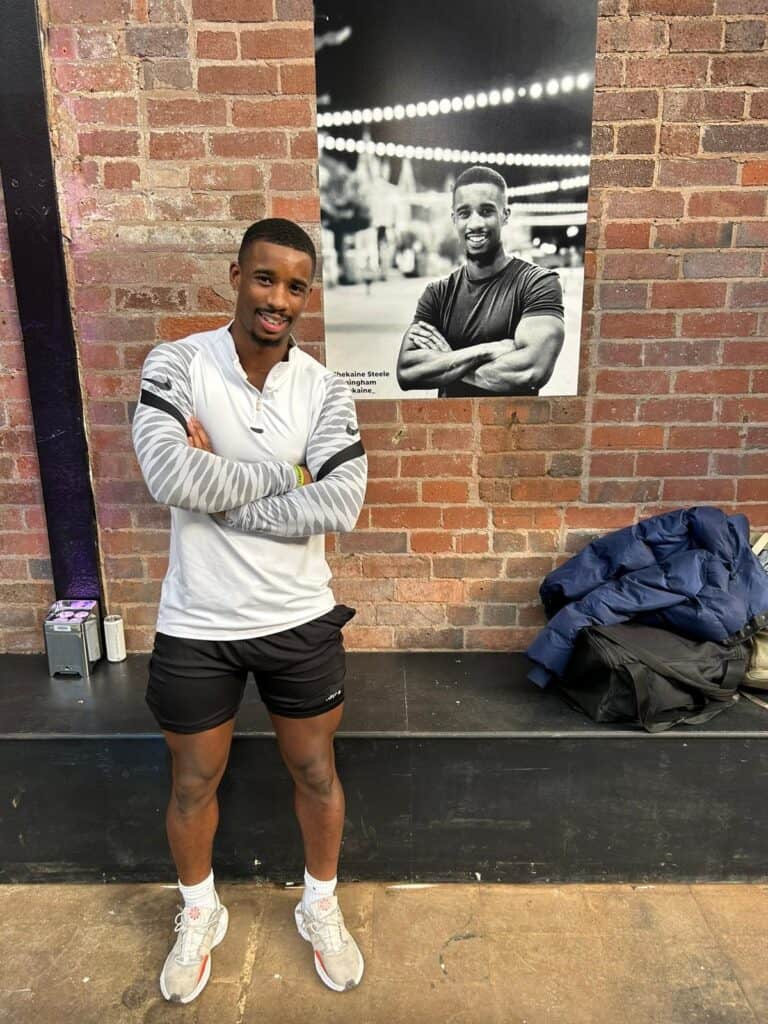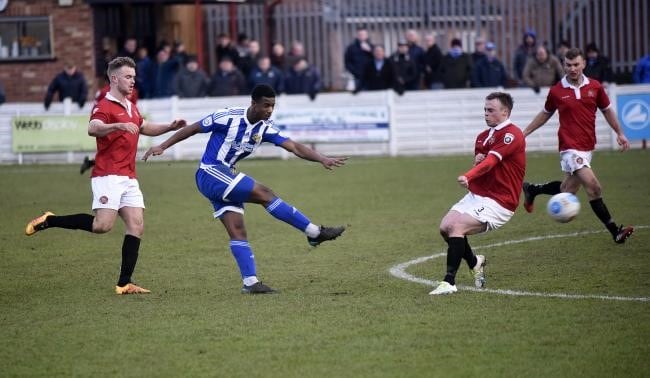In our latest Five Minutes With feature, we wanted to pay particular attention to Mental Health Awareness Week’s theme of ‘Moving more for our mental health’. Having a professional sports career by background and now being a Health Instructor at Team BSMHFT, Chekaine Steele knows all too well the benefits that physical exercise can have on our mental wellbeing.
Did you know that adults should do at least some type of physical activity every day? Or that exercising just once or twice a week can reduce the risk of heart disease or stroke. Physical activity isn’t only good for the body however, it’s also good for the mind.
In the following article, Birmingham-born Chekaine talks us through the difficulties he faced growing up with anxiety and OCD and how, with the help of therapy and sports, he is now channelling his experience to help 18–25-year-olds manage their mental health better.
Chekaine’s passion and ambition to get more people physically active is evident throughout this article and just might motivate you to take up his challenge… read more below.

Hi Chekaine, please could you start by telling us a little bit about yourself and what you do at Team BSMHFT?
Hi everyone, my title is Health Instructor. I am coming up to my second year working within a mental health setting. I worked for 12 months within an Acute setting which covered Mary Seacole House, Ardenleigh, Larimar and our Steps 2 Recovery sites such as Forward House and Endeavour Court. I now currently work within community services across Newington and Lyndon’s Community Mental Health Teams (CMHT).
Health instructors are and have been forever present within the majority of service areas such as Inpatient, Early Intervention and Secure Care. My role however is a new role that has been introduced within Newington and Lyndon CMHTs with the focus on supporting primarily 18–25-year-olds toward becoming more physically active. My role responsibilities are to promote local physical activities existing within the community, assess the physical state of service users to ensure they have no contraindications to any types of physical activity/exercise, and then to tailor and support them with their desired form of activity.
This week is Mental Health Awareness Week, the theme is ‘moving more for our mental health’, why is physical activity so beneficial for our mental health?

Physical activity has both a variety of psychological benefits and psychosocial benefits. Exercise releases ‘feel good’ hormones which can help you with improving mood, having a better self-image, increased social confidence and manage stress better. A brief walk at the local park or attending a group-based activity you enjoy can have more than just a positive impact on your physical health!
My challenge to you as the reader during this week is to identify your desired form of physical activity, make a plan of action, and give it a go! It could be something you enjoyed as a child in which you associate a lot of positivity or a good feeling with. It may be something that you have not yet tried but have always wanted to. Whatever it is, note how you can incorporate it into your week. Start off small and build it up.
Don’t be too hard on yourself. This challenge may require trial and error with different forms of physical activity however I can assure you when you find your ‘thing’, you will have a fundamental form of physical activity that can aid in the management of your mental health over the long term. If you get stuck sourcing activities the NHS’ website has a host of options accessible free of charge that may support you to identify a form of physical activity to help get you (and keep you) active for 150 minutes or more per week.
Has there ever been a stand-out moment in your career that has made you pause and reflect?

I did personal training for six years before coming into this role which involved me supporting the after care of patients who’d had a stroke. I remember working with a gentleman who had quite a lot of debilitations on his right side. I came up with a plan that supported him towards gaining mobility. He stuck to the plan, and as the weeks progressed I watched him become more independent, and was able to do daily tasks better and walk more efficiently. It was a significant standout moment for me in my career to date. I am hopeful that I will experience a lot of standout moments during my career within mental health that I will be able to reflect on with the same regard.
Why did you decide to pursue a career in mental health specifically?
I had worked for myself for quite a long period of time personal training and really wanted to get more of an insight into how physical activity/ exercise works within a clinical setting which is what drew me to the role within inpatient services as a Health Instructor. I was familiar with primary care mental health but was not aware of the more severe mental illnesses (SMI) and what goes into the management of their conditions. I found that the more I learned, the more passion I grew for wanting to make a change regarding supporting our population to not only be better informed on the benefits of physical activity but to really work at breaking some of the barriers around physical activity engagement both socially and independently.
What do you do to improve your mental health and wellbeing?

Exercise and sports have always been fundamental for the way I manage my mental health and wellbeing, as a child between the ages of 14-16-years-old I suffered with severe anxiety and obsessive compulsive disorder (OCD). This was super debilitating for me and impacted my younger years so severely that I had to do my GCSEs in my kitchen. I was fortunate that I always had sports and exercise as strengths as it reduced my social isolation and gave me something that would navigate me toward managing and overcoming the anxiousness and the routines.
As I get older, I can still experience anxiety when under a huge amount stress. However, following the guidance I received from my CAMHS therapist as a child and a good family network, I now use things such as exercise and talking, whether it be to my mom or friends to manage my mental health and wellbeing.
Past, present or future, what three people would you most want to sit down for a meal with?
I think from the past my first person would be my Grandad, I would love to sit and speak with him as a more mature man and reason with him about life, my second would be Eva Mendez as I have always had a crush on her. My final one would be Elon Musk as I just really find him fascinating and inspirational.
Tell us something that people might not know about you
Just eight years ago I was playing professional football.
Describe yourself in three words
Empathetic, passionate, and inquisitive.



Published: 15 May 2024









